


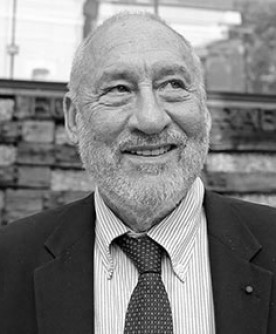
Joseph E. Stiglitz was born in Gary, Indiana. A graduate of Amherst College, he received his PHD from MIT in 1967,
became a full professor at Yale in 1970, and in 1979 was awarded the John Bates Clark Award, given biennially by the
American Economic Association to the economist under 40 who has made the most significant contribution to the field. He
has taught at Princeton, Stanford, MIT and was the Drummond Professor and a fellow of All Souls College, Oxford. He is
now university professor at Columbia University in New York, where he is also the founder and co-president of the
university's Initiative for Policy Dialogue, and a member and former chair of its Committee on Global Thought. In 2001, he
was awarded the Nobel Prize in economics for his analyses of markets with asymmetric information, and he was a lead
author of the 1995 Report of the Intergovernmental Panel on Climate Change, which shared the 2007 Nobel Peace Prize.
In 2011, TIME named Stiglitz one of the 100 most influential people in the world. He is now serving as president of the
International Economic Association.
Stiglitz was a member of the Council of Economic Advisers from 1993-95, during the Clinton administration, and served as
CEA chairman from 1995-97. He then became chief economist and senior vice president of the World Bank from 1997-
2000. In 2008, he was asked by the French President Nicolas Sarkozy to chair the Commission on the Measurement of
Economic Performance and Social Progress, which released its final report in September 2009 (published as
Mismeasuring Our Lives). He now chairs a high level expert group at the OECD attempting to advance further these
ideas. In 2009, he was appointed by the President of the United Nations General Assembly as chair of the Commission of
Experts on Reform of the International Financial and Monetary System, which also released its report in September 2009
(published as The Stiglitz Report). Since the crisis, he has played an important role in the creation of the Institute for New
Economic Thinking (INET), which seeks to reform the discipline so it is better equipped to find solutions for the great
challenges of the 21st century.
Stiglitz serves on numerous boards, including the Acumen Fund and Resources for the Future
Stiglitz helped create a new branch of economics, "The Economics of Information," exploring the consequences of
information asymmetries and pioneering such pivotal concepts as adverse selection and moral hazard, which have now
become standard tools not only of theorists, but also of policy analysts. He has made major contributions to
macroeconomics and monetary theory, to development economics and trade theory, to public and corporate finance, to
the theories of industrial organization and rural organization, and to the theories of welfare economics and of income and
wealth distribution. In the 1980s, he helped revive interest in the economics of R&D
His work has helped explain the circumstances in which markets do not work well, and how selective government
intervention can improve their performance.
In the last 15 years, he has written a series of highly popular books that have had an enormous influence in shaping global
debates. His book Globalization and Its Discontents (2002) has been translated into 35 languages, besides at least two
pirated editions, and in the non-pirated editions have sold more than one million copies worldwide. In that book he laid
bare the way globalization had been managed, especially by the international financial institutions. In two later sequels, he
presented alternatives: Fair Trade for All (2005, with Andrew Charlton) and Making Globalization Work (2006). In The
Roaring Nineties (2003), he explained how financial market deregulation and other actions of the 1990s were sowing the
seeds of the next crisis. Concurrently, Towards a New Paradigm in Monetary Economics (2003, with Bruce Greenwald)
explained the fallacies of current monetary policies, identified the risk of excessive financial interdependence, and
highlighted the central role of credit availability. Freefall: America, Free Markets, and the Sinking of the World Economy
(2010) traced in more detail the origins of the Great Recession, outlined a set of policies that would lead to robust
recovery, and correctly predicted that if these policies were not pursued, it was likely that we would enter an extended
period of malaise. The Three Trillion Dollar War: The True Cost of the Iraq Conflict (2008, with Linda Bilmes of Harvard
University), helped reshape the debate on those wars by highlighting the enormous costs of those conflicts. His most
recent books are The Price of Inequality: How Today's Divided Society Endangers Our Future, published by W.W. Norton
and Penguin/ Allen Lane in June 2012, Creating a Learning Society: A New Approach to Growth, Development, and
Social Progress, with Bruce Greenwald, published by Columbia University Press in 2014 and The Great Divide: Unequal
Societies and What We Can Do About Them (April 2015), in which he suggests ways to counter America’s growing
problem.
Stiglitz's work has been widely recognized. Among his awards are more than 40 honorary doctorates, including from
Cambridge and Oxford Universities. In 2010, he was awarded the prestigious Loeb Prize for this contributions to
journalism. Among the prizes awarded to his books have been the European Literary Prize, the Bruno Kreisky Prize for
Political Books and the Robert F. Kennedy Book Award. He is a fellow of the National Academy of Sciences, the American
Academy of Arts and Sciences, the American Philosophical Society, and the Econometric Society, and a corresponding
fellow of the Royal Society and the British Academy. In 2015, Stiglitz was named to Politico’s list of the 50 thinkers, doers
and visionaries transforming American politics today
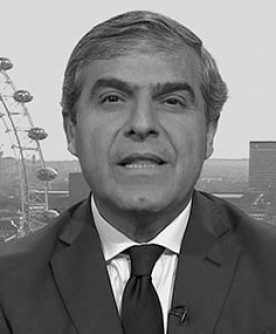
Fawaz A. Gerges is a Professor of international relations at the London School of Economics and Political Science where he holds the United Arab Emirates Chair in Contemporary Middle Eastern Studies at LSE. He was the LSE’s inaugural Director of the Middle East Centre from 2010 until 2013. He earned a doctorate from Oxford University and M.Sc. from the London School of Economics and Political Science. He has taught at Oxford, Harvard, and Columbia, and was a research scholar at Princeton and chairholder at Sarah Lawrence College, New York.
He is author of several acclaimed books, including three newly-released – ISIS: A History (Princeton University Press, February 2016); The New Middle East: Social Protest and Revolution in the Arab World (Cambridge University Press, 2013); and Contentious Politics in the Middle East: Popular Resistance and Marginalised Activism beyond the Arab Uprisings (Palgrave Macmillan, 2015). His other books include: Obama and the Middle East (Palgrave and MacMillan, 2012); The Rise and Fall of Al Qaeda (Oxford University Press, 2011); The Far Enemy: Why Jihad Went Global (Cambridge University Press, 2009); America and Political Islam: Clash of Cultures or Clash of Interests? (Cambridge University Press, 1999); and The Superpowers and the Middle East: Regional and International Politics (Oxford and Westview Press, 1993).
Forthcoming books:
His articles have appeared in The New York Times, The Washington Post, The Los Angeles Times, The Christian Science Monitor, International Herald Tribune, The Baltimore Sun, The Guardian; The Independent, Foreign Affairs, Foreign Policy, Newsweek, Middle East Journal, Survival, the Guardian, and many others.
Gerges has given hundreds of tv and radio interviews for top talk and news shows and programs on various media outlets throughout the world, including BBC, Sky, CNN, ABC, PBS, CBS, NBC, MSNBC, NPR, and CBC.
He has been the recipient of a MacArthur, Fullbright and Carnegie Fellowships and his books have been translated into a number of foreign languages.
His special interests include the international relations of the Middle East, the political economy of the Middle East, risk analysis, Islam and the political process, mainstream Islamist movements and jihadist groups (like the Muslim Brotherhood, Al Qaeda, and ISIS); Arab politics and Muslim politics in the 20th century, state and society in the region, the Arab-Israeli conflict, American foreign policy towards the Muslim world, the modern history of the Middle East, history of conflict, diplomacy and foreign policy, and historical sociology.
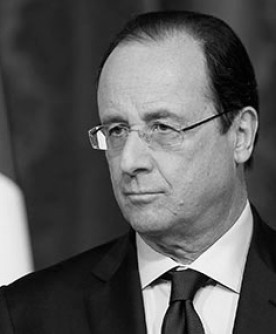
François Hollande was the President of the French Republic from May 2012 to May 2017. During his mandate, he carried
out important reforms which restored the competitiveness and the growth of the French economy. He faced authoritatively
the terrorist attacks that afflicted the country in 2015 and 2016.
President Hollande took important decisions on behalf of France, in particular the engagement of the Army in Mali in order
to fight against terrorist groups located in the Sahel. It is under his presidency that a global climate agreement was
adopted in Paris in December 2015.
Today, President Hollande chairs the Foundation “France is committed” whose mission is to support all initiatives that
contribute to reinforcing solidarity and creating bonds between citizens
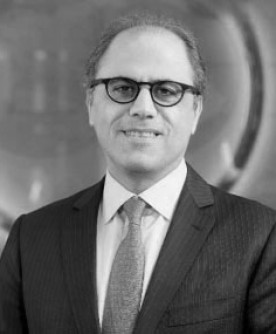
Jihad Azour has been the Director of the International Monetary Fund’s Middle East and Central Asia Department (MCD) since March 2017. Mr. Azour served as Lebanon’s Finance Minister during 2005–08, during which time he coordinated the implementation of important reform initiatives at the national level and within the Finance Ministry. Before and since his time as finance minister, he held a wide range of posts in the private sector, including McKinsey and Booz and Co. where he served as vice president and senior executive advisor between 2009–13. Prior to joining the Fund he was a managing partner at advisory and investment firm Inventis Partners.
Mr. Azour holds a PhD in International Finance and a post-graduate degree in International Economics and Finance, both from the Institut d'Etudes Politiques de Paris. He also did research on emerging economies and their integration into the global economy as a post-doctoral fellow at Harvard, and holds a Master's degree in Applied Economics and Finance from Dauphine University, Paris. He published five books and several articles on economic and financial issues and had a long teaching experience.
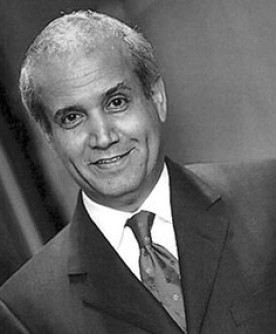
Abdulrahman Al‐Rashed is the former General Manager of Al Arabiya News Channel. A veteran and internationally acclaimed journalist, he is a former editor‐in‐chief of the London‐based leading Arab daily Asharq al‐Awsat, where he still regularly writes a political column. He has also served as the editor of Asharq al‐Awsat’s sister publication, al‐Majalla. Throughout his career, Rashed has interviewed several world leaders, with his articles garnering worldwide recognition, and he has successfully led Al Arabiya to the highly regarded, thriving and influential position it is in today.
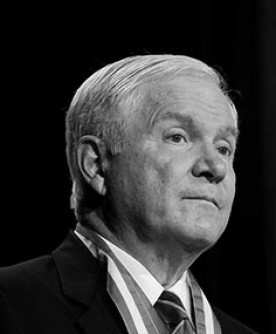
Robert Gates served as the 22nd secretary of defense (2006-2011) and is the only secretary of defense in U.S. history to
be asked to remain in that office by a newly elected President. President Barack Obama is the eighth president Gates has
served. He previously served under President George W. Bush.
On Gates’ last day in office, President Barack Obama awarded him the Presidential Medal of Freedom, America’s highest
civilian honor.
Before becoming secretary of defense in 2006, Gates was the president of Texas A&M University, the nation’s seventh
largest university. Prior to assuming the Texas A&M presidency on August 1, 2002, he served as interim dean of the
George Bush School of Government and Public Service at Texas A&M from 1999 to 2001.
Gates joined the Central Intelligence Agency in 1966 and spent nearly 27 years as an intelligence professional. During
that period, he spent nearly nine years at the National Security Council, the White House, serving four presidents of both
political parties.
Gates served as director of Central Intelligence from 1991 until 1993. He is the only career officer in CIA’s history to rise
from entry-level employee to director. He served as deputy director of Central Intelligence from 1986 until 1989 and as
assistant to the President and deputy national security adviser at the White House from January 20, 1989 until November
6, 1991, for President George H.W. Bush.
Gates has been awarded the National Security Medal, the Presidential Citizens Medal, has three times received the
National Intelligence Distinguished Service Medal, and has three times received CIA’s highest award, the Distinguished
Intelligence Medal. In April, 2016, he became the inaugural recipient of the Zbigniew Brzezinski Annual Prize, in
recognition of his distinguished record of promoting the importance of geostrategic thinking with a transcending moral
purpose.
He has authored three memoirs - Duty: Memoirs of a Secretary at War (2014), a straightforward, vividly written account of
his experience serving Presidents George W. Bush and Barack Obama during the wars in Iraq and Afghanistan, From the
Shadows: The Ultimate Insider’s Story of Five Presidents and How They Won the Cold War (1996) which details his
career as a CIA officer at the center of power during a time when the threat of global annihilation informed America’s every
move, and A Passion for Leadership: Lessons on Change and Reform from Fifty Years of Public Service (January 2016),
in which Gates draws on years of exceptional experience to offer readers a powerful, informative and pragmatic look at
leadership.
Until becoming secretary of defense, Gates served as chairman of the independent trustees of The Fidelity Funds, the
nation’s largest mutual fund company, and on the board of directors of NACCO Industries, Inc., Brinker International, Inc.
and Parker Drilling Company.
Gates currently serves on the board of directors of Starbucks and is partner in the consulting firm, RHG LLC, with former
Secretary of State Condoleezza Rice and others. He has also served on the board of directors and executive committee of
the American Council on Education, the board of directors of the National Association of State Universities and LandGrant Colleges. He has also been president of the Boy Scouts of America, and the National Eagle Scout Association.
A native of Kansas, Gates received his bachelor’s degree from the College of William & Mary, his master’s degree in
history from Indiana University and his doctorate in Russian and Soviet history from Georgetown University. Gates was
installed as chancellor of the college of William & Mary, beginning in February 2012. He is the first William & Mary
alumnus in the modern era to serve as chancellor of the college.
In 1967, he was commissioned a second lieutenant in the U.S. Air Force and served as an intelligence officer at Whiteman
Air Force Base in Missouri.